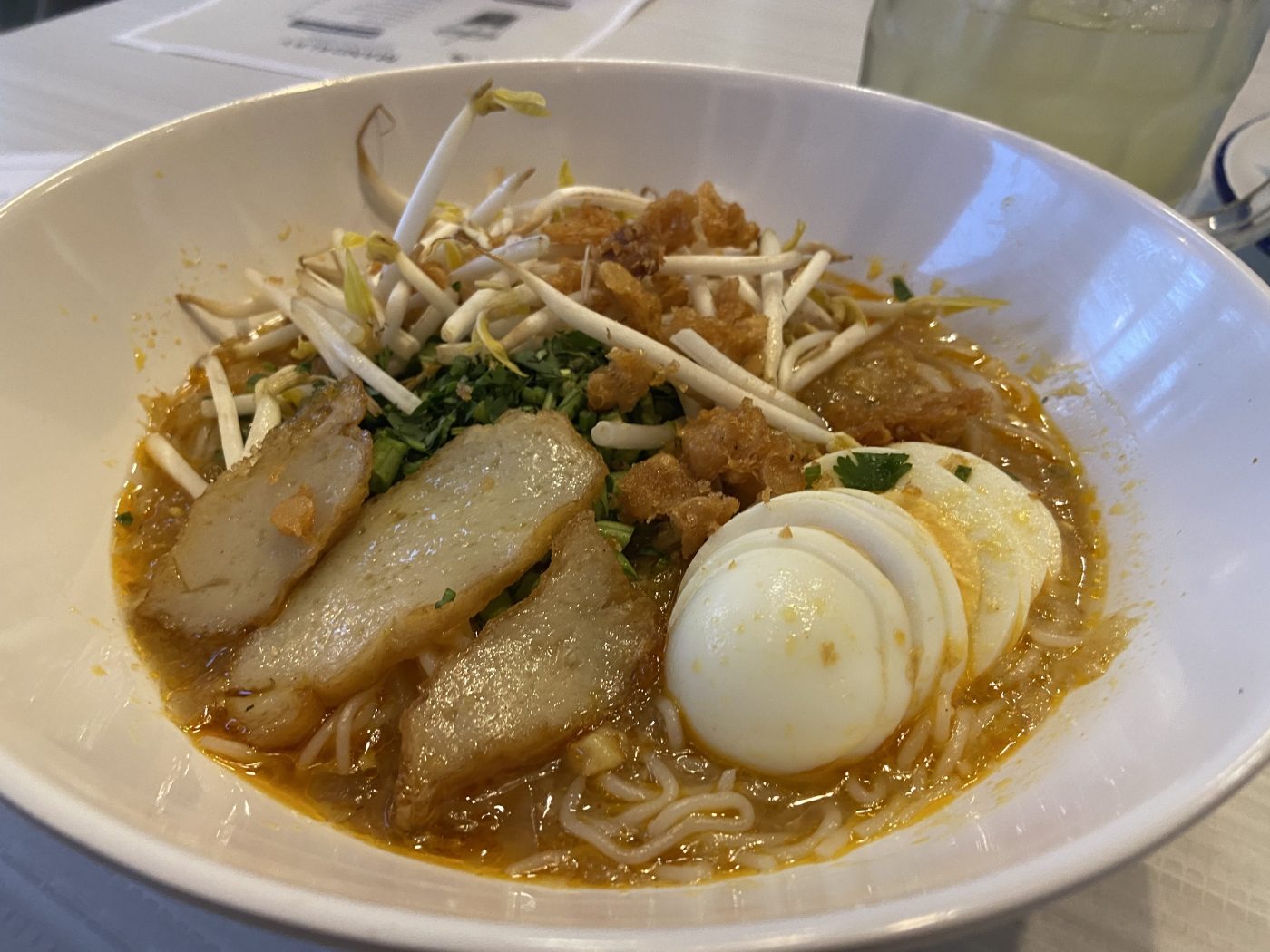
Mandalay Kitchen brings traditional Karen and Burmese flavors to Frogtown
The first day Mandalay Kitchen opened was also the first day the new restaurant’s founder and owner, Chris Tunbaw, had worked in food service.
But earlier this year, when he told his family and friends that he’d signed a lease, those who knew him well were not surprised: Ever since he was a boy, he said, he’s been dreaming of opening a restaurant serving traditional Karen and Burmese food.
Chris Tunbaw, owner of the new Frogtown restaurant Mandalay Kitchen that serves traditional Karen, Burmese and Thai dishes. (Photo courtesy Chris Tunbaw)
Mandalay Kitchen opened in early November, in the former Marc Heu Patisserie spot on the corner of University and Western avenues, with a variety of noodle and rice salads, soups, stir-fries and other entrees.
Tunbaw’s family is Karen, a minority ethnic group in Myanmar that has long faced persecution and sought independence. Over the past half-century in particular, many Karen people — including Tunbaw’s family — have fled the country. Now, significant Karen populations live in refugee camps in Thailand and in St. Paul, the largest Karen community in the U.S., per the Karen Organization of Minnesota.
(A note on names: Following a violent military coup in 1988 in what was then called Burma, the new ruling junta changed the official name of the country to Myanmar. This was controversial; some who opposed the military government continued to use “Burma.”)
Tunbaw arrived in Minnesota when he was 10. A few years ago, Tunbaw returned to Myanmar for the first time since the family left in the late 1990s. His mother came with him, and together, they visited her hometown, went foraging and fishing and tasted modern Burmese food.
“I didn’t get a chance to know what Burma looks like (as a child),” Tunbaw said. “It felt like home. … I just want to showcase who we are, especially as the kid that didn’t have a country. Having to flee, trying to find their identity. This is a restaurant for us.”
Now, Mandalay Kitchen is one of just a handful of Karen restaurants in the Twin Cities. Tunbaw is also using a portion of the upstairs level to sell clothing and other handmade crafts by artisans in Myanmar and locally.
Small Bites Review: Mandalay Kitchen’s traditional Burmese food is both delicate and flavorfully pungent
The food menu at Mandalay Kitchen blends Karen, Burmese and Thai food cultures, which Tunbaw said is a reflection of his personal experiences and heritage. He has carefully calibrated the menu to offer the Karen community a taste of their traditional cultural foods while also serving as a primer to Karen and Burmese cuisine for those who’ve never had it, he said.
So the menu includes traditional dishes — K’nyaw pumpkin curry is a traditional stew made with kabocha squash; lahpet thoke is a Burmese salad made of fermented green tea leaves — and more inventive ones like the chapli burger, which Tunbaw bills as a “Southeast Asian Juicy Lucy.”
When you visit Mandalay Kitchen, be sure to start with a glass of sugarcane juice. It’s a classic beverage in Myanmar, and revenue from sales of sugarcane juice at local soccer games and other cultural events helped Tunbaw afford to launch the brick-and-mortar restaurant.
The restaurant’s fresh-pressed sugarcane juice is sweet but not overly so, and quite refreshing; less sour and much more tropical than lemonade.
As for food, Tunbaw’s Burmese samosas, filled with curry-spiced (but not spicy) mashed potato, are delightful and surprisingly delicate. Buu thee kyaw, or French fry-shaped strips of bottle gourd fried in tempura batter, have a nice creamy interior but a bit of a vegetal, bitter finish.
On the streets of Myanmar, these items might be served with more pungent fish sauce or tamarind relish on the side, Tunbaw said, but he swaps in a couple sweet-and-sour sauces instead. He hopes these options will feel more familiar to diners who have not tried Burmese food before, though I personally can’t help but feel disappointed whenever restaurateurs feel they have to tone down or skip traditional flavors for a Minnesota audience.
The mohinga at Mandalay Kitchen, though, is straight out of Tunbaw’s childhood.
Mohinga, a traditional Burmese fish soup, is served with catfish cake, egg, and crispy chickpeas at Mandalay Kitchen in Frogtown on Nov. 14, 2023. (Jared Kaufman / Pioneer Press)
Mohinga is a noodle soup with fish broth that’s ubiquitous across Myanmar, though recipes vary by region. Tunbaw’s family recipe comes from the mountainous, ethnically Karen part of the country and contains a sliced catfish cake, boiled egg, and crunchy bits of fried chickpeas.
Visually, the bowl of soup resembles Vietnamese pho or Japanese ramen, but the broth is completely different in flavor. It’s a rich, hefty fish stock, slightly sour and earthy, with behind-the-scenes flavors that remind me of ginger, lemongrass and turmeric.
This is what Tunbaw ate growing up. After all, his own mother, Pawlar, made this very bowl of mohinga: On a recent afternoon at Mandalay Kitchen, she was cooking.
Burmese food is still fairly unique among local restaurants.
“I want to have (our food) in the Twin Cities,” Tunbaw said. “When there’s people like me: young people that can’t identify with restaurants or a food scene that’s not their identity.”
Food is a Tunbaw family affair
When Tunbaw was a child, his family lived in a somewhat secluded jungle area of Myanmar. For the first six months in Minnesota, they lived in the basement of a church that had sponsored their migration, he said, and they ultimately moved to a house nearby at the corner of Dale Street and Blair Avenue.
Many of Tunbaw’s earliest food-adventure memories are in the exact area of Frogtown where his restaurant is now located, he said.
“I grew up surrounded by food,” Tunbaw said. “One thing I appreciate about food (is) I’m able to bring people together. It helps me make friendship with other people by sharing that commonality. This is the place I’m able to do that.”
And now, at Mandalay Kitchen, many of the most important people in his life are helping him work toward this goal.
On a recent weekday afternoon, his mom, Pawlar, was cooking in the kitchen. Abbey Kroll, his girlfriend, was managing the front-of-house. Tunbaw recruited a cousin who lives in Yangon, Myanmar, to help arrange shipments of some imported ingredients. The place has only been open a couple of weeks, but Tunbaw’s childhood friend’s dad has already become a regular.
When Marc Heu moved his namesake bakery to Selby/Dale earlier this year, the landlord of the Frogtown storefront was looking for a tenant who’d keep the place community-focused, Kroll said. Turns out, that landlord is Tunbaw’s longtime hairdresser and has known the family since Tunbaw was young, she said, so Mandalay Kitchen has had community support since before day one.
The restaurant is dedicated to Tunbaw’s grandmother Daphne Tun Baw, the matriarch of a family that’s particularly well-respected in both Southeast Asia and St. Paul. She died earlier this year a few months shy of her 102nd birthday — and before she could see Tunbaw open Mandalay Kitchen.
A mural outside Mandalay Kitchen in Frogtown depicts three women including owner Chris Tunbaw’s grandmother Daphne Tun Baw (center), a noted education advocate among the Karen community, an ethnic group native to Myanmar. The mural, shown on Nov. 14, 2023, was painted by local Karen artist Eh Soe. (Jared Kaufman / Pioneer Press)
Talking about her legacy, Tunbaw became emotional. He hopes the restaurant will highlight her life and honor her memory, and he plans to start a foundation in her name, too. She’s also one of three women portrayed in a new mural outside Mandalay Kitchen, painted by local Karen artist Eh Soe.
Daphne Tun Baw was regarded as a pioneer in women’s education in Karen communities in Myanmar and Thailand. Well into her 80s, she was the schoolmaster at a Karen refugee camp in Thailand. When actor Angelina Jolie visited the camp several decades ago, a conversation with Daphne led directly to the actor’s significant donation of clothing and resources to the community.
Tunbaw is also inspired by his father, Wilfred Tun Baw.
In Myanmar, Wilfred Tun Baw served as a fighter in the Karen independence movement, and since moving to the Twin Cities, has helped establish much of the local Karen community infrastructure that exists here today. He formerly served as the inaugural executive director of the Karen Organization of Minnesota, which has helped thousands of Karen refugees land on their feet in the Twin Cities.
Conversations with his grandmother, father and other Karen activists in Myanmar were pivotal to Tunbaw’s plans for Mandalay Kitchen, he said — the importance of dedicating your time to an ideal you’re committed to; of contributing to the common good.
For him, that ideal is sharing Karen culture through food.
“They inspired me to build this place,” he said. “When you have all the resources at your disposal, especially with what little time you have (on Earth), are you going to pursue it?”
Small Bites are first glances — not intended as definitive reviews — of new or changed restaurants.
Mandalay Kitchen
Where: 383 W. University Ave
Hours: Open 11 a.m. to 8 p.m. Tuesday through Thursday; 11 a.m. to 9 p.m. Friday and Saturday; 11 a.m. to 8 p.m. Sunday. Closed Monday.
Contact: 651-219-5887; mandalaykitchenstp.com
Prices: Appetizers range from $9.95 to $12.95; soups and salads from $11.95 to $19.95; entrees from $12.95 to $16.95. Sugar cane juice is $7 for a large mug; other drinks run $3 to $5.
Good to know: Owner Chris Tunbaw is also aiming to showcase Karen culture through traditional crafts: Head upstairs to check out the artisan marketplace with products imported from makers in Myanmar and Thailand.
Related Articles
Revival Smoked Meats, Mr. Paul’s Po Boys coming to Malcolm Yards
Now open: Pauly’s Pub and Grill, a very St. Paul neighborhood bar, in the former Kalsada spot
Diane’s Place, a Hmong-French restaurant from a top pastry chef, set to open next year in Minneapolis
Keg and Case Market ownership goes to lender after opening 5 years ago to fanfare
5 strategies for navigating today’s digital tipping culture


